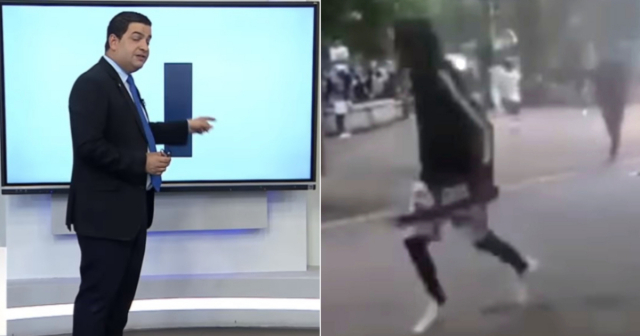Cuban state media offered an update on Monday on the events at the Finca de los Monos and increased the number of injured in the massive fight that occurred on Saturday, June 8, to eight.
Likewise, he revealed that the investigation of the events has led to the arrest of several individuals involved in fights between groups of young people, including minors, armed with machetes and other weapons.
A report from the Cuban Television News (NTV) raised the number of injured in the fights to eight. The initial version of the events, provided by the regime's spokesperson and television presenter, Humberto López, put at six the number of people who received medical assistance after the massive brawl.
Yaimara Angulo González, deputy chief prosecutor in Havana province, stated that there are "several young people detained" (aged between 16 and 20 years) for their involvement in the events.
Without revealing figures, the official indicated that among those under investigation there are several minors, and stated that at "the moment" the crime of "public disorder" is considered proven, although the substantiation of others is not ruled out during the process.
In addition, provincial authorities believe that there are responsibilities between the organizers and the institutions that supported the holding of the event, but they insisted on its illegal nature.
The official journalist Lázaro Manuel Alonso interviewed the administrator of the Finca de los Monos and the manager of the Klatus Creativo company, organizer of the event, but did not include their statements in his report. According to Alonso, both defended their version that the authorities of Cerro were informed of the program for that day and had approved its celebration.
Alonso's report did collect the statements of the Cerro Mayor, Elena Luis Rodríguez, who reaffirmed the unauthorized nature of the event. "Each activity has a protocol and must appear in the Plan. If it is not in the plan, it is not a formal activity. Therefore, that activity did not go through the corresponding channels."
However, the Intendent did admit that officials from the "recreation department" were indeed aware of the activity, so it is not ruled out that they will be investigated and sanctioned. This was explained by the coordinator of programs and objectives of the Government of Havana, Tatiana Viera Hernández, who categorically denied that the organizers or the local government had informed the provincial government authorities.
“That is why the relevant investigations are currently being carried out,” said Viera Hernández. More directly, Roilán Rodríguez Barbán, a member of the Provincial Bureau of the Communist Party of Cuba (PCC) in Havana, stated that “there was administrative responsibility on the part of local authorities and the corresponding measures will be taken with those responsible.”
On the other hand, Colonel Tania Fernández Cordero, head of the National Revolutionary Police (PNR) of Havana, considered that their performance was impeccable and that they managed to control the situation and restore order quickly once they received the report of the disturbances.
In addition to those involved in the events, the provincial deputy chief prosecutor in Havana did not rule out that the investigation may determine other criminal responsibilities among social media users and media outlets who, she said, disseminated false information and created an unjustified state of alarm in society.
The second line of investigation is aimed at determining the identity of people who, in an unscrupulous manner, disseminated fake news. It is necessary to establish why they did it, with what purpose they alarmed the population. This behavior may constitute a crime," considered Angulo González, referring to Article 103.2 of the new Penal Code of the Cuban regime.
Ten days after the event, the official Cuban press revisits some incidents that caused alarm and astonishment among Cubans due to their blatant violence and the age of those involved.
Criticized for its delay in reporting the news and for its eagerness to cover up the events behind an alleged "maneuver" by independent media and activists on social networks to "create destabilization," the Cuban regime presented on Monday a more "journalistic" version than the one given by López.
However, despite Alonso's report covering some informational gaps (such as the dissemination of images of the events) and appearing more thorough and contrasting when presenting its version, the officialist narrative continues to emphasize the "disinformation" and "alarm" created by the independent press, considered "enemies of the revolution."
The report did not address the increase in violence in Cuba, its causes, and various manifestations. No expert provided their opinions on events that have sparked intense debate in civil society. Errors and local administrative responsibilities were acknowledged, but the repressive apparatus of the regime warned that other responsibilities will be sought, and the "guilty" will pay.
What do you think?
COMMENTFiled under:
